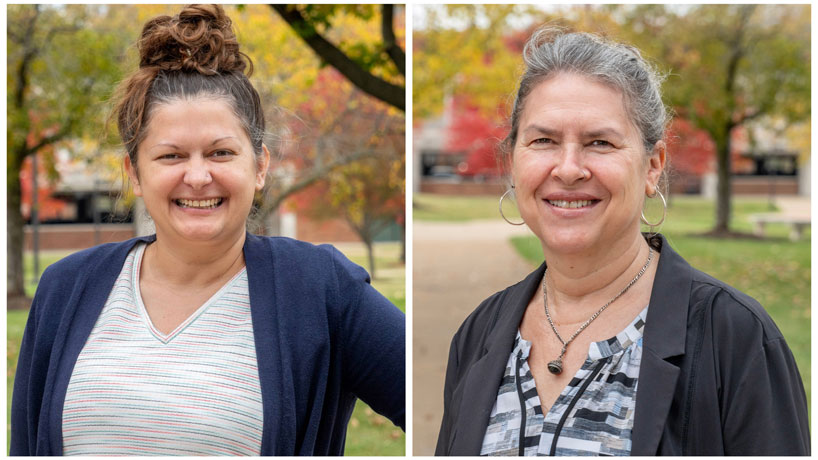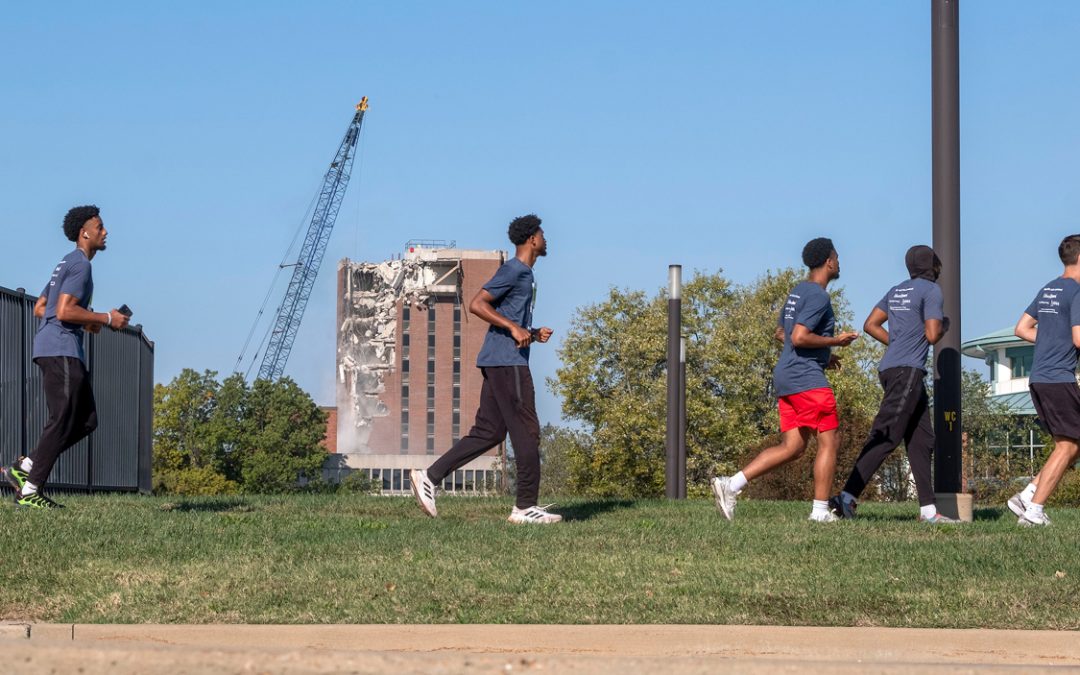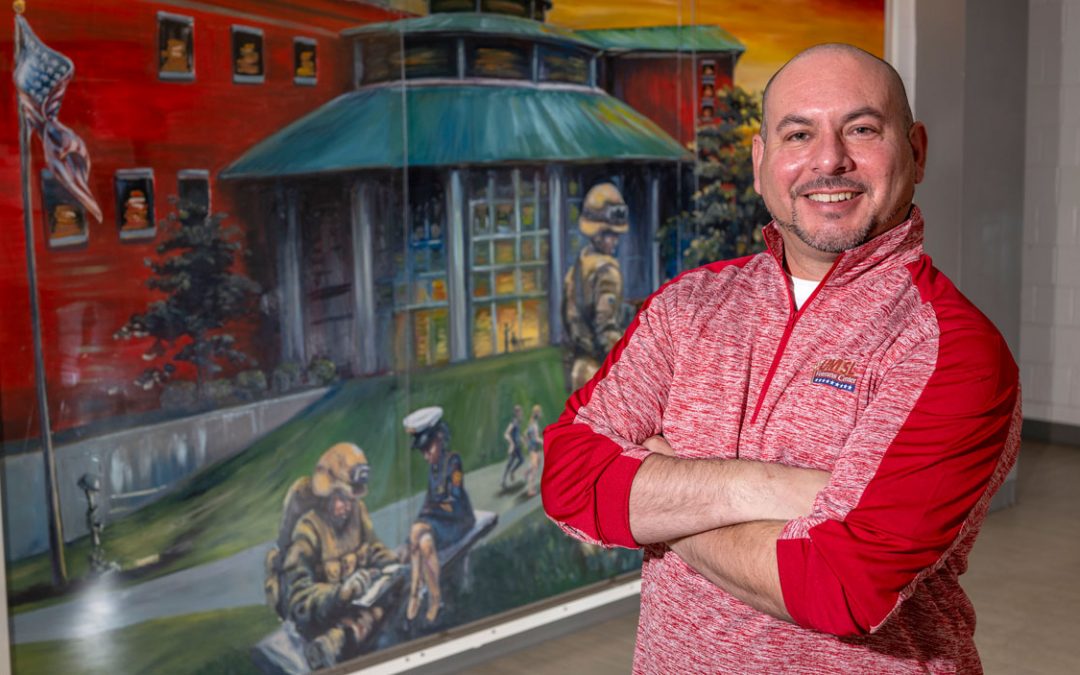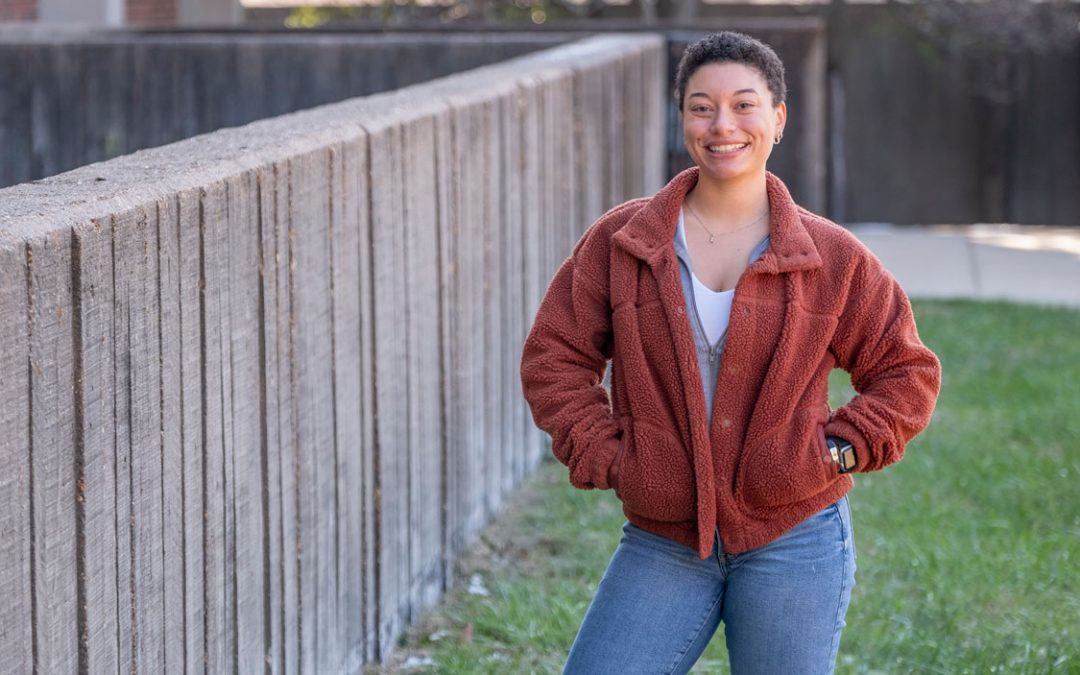
Jessica Swederske (left) is now the director of the Title IX and Equity Office at UMSL and Marlo Goldstein Hode (right) is now director of Conflict Resolution and Mediation Services. (Photos by Derik Holtmann)
The Office of Diversity, Equity and Inclusion is expanding the scope of its work at the University of Missouri–St. Louis thanks to two new positions.
Marlo Goldstein Hode, formerly the senior manager of Strategic Diversity Initiatives, has taken on a new role as director of Conflict Resolution and Mediation Services, while Jessica Swederske is now the director of the Title IX and Equity Office after previously serving as acting Title IX Coordinator on an interim basis for several months.
Marlo Goldstein Hode
Vice Chancellor for Diversity, Equity and Inclusion Tanisha Stevens said that when Title IX Coordinator and Chief Equity Officer Dana Beteet Daniels retired earlier this year after over 20 years of service to UMSL, it gave her an opportunity to think about the direction of ODEI moving forward. In order to better meet the needs of faculty and staff on campus and utilize Hode’s skillset, she decided to restructure the office with a new focus on conflict resolution and campus mediation.
“Marlo conducts professional development training around DEI topics, but another piece we were hearing when we did supervisory trainings with HR was how to handle conflict,” Stevens said. “At the core of equity work, typically, there is some kind of conflict. This new role gives us an opportunity to not only revitalize the campus’ mediation services but also provide members of the campus community with the opportunity to receive conflict coaching, and when necessary, identify ways to address issues that may be impacting the welcoming and inclusive nature of the university. Part of Marlo’s new role will be to educate the campus community on how, when we think about equity work, that often means addressing conflict.”
Hode, who holds an LLM in dispute resolution from the University of Missouri School of Law and has workplace mediation certification, previously piloted a staff ombuds program at UMSL in the 2022-23 academic year. With the restructuring of ODEI, she sees an opportunity to make conflict resolution and mediation services more accessible to the UMSL community under more familiar nomenclature. Working in collaboration with Human Resources and Academic Affairs to ensure mediation services align and integrate with campus policies, she will continue to offer many of the same services as the ombuds program, including both individual conflict coaching and group facilitation, but expand the scope of these services – which are now available to both faculty and staff.
“If an employee’s having an issue with their supervisor, another employee or a colleague somewhere else on campus and is really looking for ways to try to approach it effectively, they can meet with me confidentially to talk things through, strategize and come up with some different ways that they might approach that situation, typically through communication,” Hode said. “With the mediation services, sometimes people have either tried to approach it themselves and it didn’t work or, for various reasons, feel like it would be more beneficial to have a neutral third party there to facilitate that discussion, because these discussions can be hard. Oftentimes, instead of dealing with the conflict, people just avoid it and let it fester.”
“I think how Marlo approaches conflict in this new role provides an avenue for more conversations,” Stevens added. “Because we know what’s important to this work is creating spaces for people to be able to engage in dialogue.”
In her new role, Hode will also be expanding the scope of the professional development workshops offered to faculty and staff on campus. Where previous workshops focused on DEI topics such as implicit bias, microaggressions and fostering belonging – which, she notes, are all relevant to conflict – she will now center trainings on active listening skills, asking effective questions to resolve conflict and uncovering needs and interest in conflict. She is planning to offer an intensive four-hour training specifically for supervisors, as well as conflict resolution skills training for faculty and staff.
“Conflict is universal, so it’s a way to have touch points with faculty and staff who might not normally come to our office,” Hode said. “I’ve certainly seen that in some of the professional development opportunities that I’ve facilitated so far this semester. I have seen people in those spaces that I’ve never seen in any other trainings so I think it’s already successful in that regard.”
Hode will also continue her broader DEI work, including working with faculty hiring committees and the campus Equity Advisor program to support inclusive and equitable hiring practices and facilitating an online DEI program for professionals in the St. Louis region. At the end of the day, though, she believes that conflict resolution is an integral part of that larger work.
“We wouldn’t really be talking about diversity, equity and inclusion if there were no challenges or issues,” Hode said. “We have to constantly manage, negotiate and navigate our differences in order to reap the benefits of what these differences can lead to. A healthy conflict culture allows for disagreements to surface and be approached constructively so that we can reap the benefits, such as improving relationships, learning more and improving processes.”
Jessica Swederske
In her new position as director of Title IX and Equity Office, which she officially assumed on Nov. 1 after acting as Title IX coordinator and equity officer upon Dana Beteet Daniels’ retirement this summer, Swederske will oversee compliance for Title IX and equity complaints on campus.
“The Title IX space is really about continuous education as it relates to our equity and nondiscrimination processes and encouraging members of the campus community to utilize those processes when appropriate,” Stevens said. “Moving forward, Jessica will be responsible for the direction of the Title IX and Equity Office including hiring additional staff and focusing more on the procedural process, which includes educating the campus about their role/responsibilities as university employees. As an example, during the spring semester, Jessica will be introducing the ‘lunch and learn with Title IX’ series, which are conversations in partnership with campus and community partners around specific topics related to Title IX and equity. I look forward to how she will build upon the existing structure but move the unit forward.”
Swederske originally came to UMSL in August 2015 as a Title IX and Equity investigator after earning both a bachelor’s in psychology and a master’s in public policy administration from the university. A self-described shy student, she initially started her college career at another university before transferring to UMSL to be a little closer to home. UMSL proved to be a transformational experience for her, starting with Associate Professor Matthew Taylor’s cross-cultural psychology course.
“His class was the first class I had taken in my entire undergraduate career that I felt comfortable speaking up and sharing my opinions and being active in the class,” she said. “It was the first class where I actually felt comfortable and that my opinion mattered. That’s where I started really getting engaged in my education and started to come out of my shell.”
After earning her degree, she worked for about two years before returning to UMSL in 2010 to earn her MPPA, specializing in justice policy. Hearing from locals working in city infrastructure, planning and policy during the program piqued her interest in public service and helped her find her niche. She had been working for the state of Missouri as a parole officer for over three years when a friend who worked as a police officer at UMSL informed her about an open position in the university’s Title IX office. Although she admittedly didn’t know much about Title IX at the time, as she began researching, she felt like it would be a good fit for her skillset and ultimately ended up receiving an offer. She’s been at the university ever since.
“I don’t know that I ever pictured myself working in higher education before, but now that I’m in it, I don’t know that I could picture myself working outside of higher education,” she said. “I get the opportunity to interact with students and guide them, not so much in their studies but in struggles they’re having related to potential equity or Title IX concerns. I work with faculty who are having concerns with their students, and I get to walk them through how to manage that, and I get the opportunity to talk with faculty and staff about their experiences as well. I have different pockets of people I work with and each pocket has different experiences and levels of knowledge – that’s something I really enjoy about higher education and look forward to continuing in my role as director.”
In her new and expanded role, Swederske will continue to work closely with individuals across campus in order to have proactive conversations related to Title IX and equity. She will also be responsible for managing trainings for students, faculty and staff, overseeing investigations including the supervision of the campus’ lead investigator and trained campus investigations as well as serving as the final decision-maker for potential policy violations. But moving forward, she has her sights set on building and expanding relationships around campus, particularly with Athletics, Facilities and Maintenance, and offering more targeted one-on-one trainings with academic departments.
“I think that when we get ahead of situations with preventative measures, we’re dealing with issues head-on instead of dealing with issues after they happen,” she said. “That’s really the spot I’d like to be in…where I am engaged in proactive conversations with the campus and when we do become aware of those concerns, the campus community knows the process to report. As director, I really hope to focus my efforts strategically across the campus, hone in on areas of concern and have specialized training opportunities for the entire campus community.”














